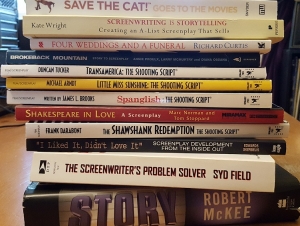by Renée J. Lukas
 Please forgive me, but I have to go on a little rant this morning. Usually, I can laugh off these things. But today, my hair caught fire reading a job board, so I have to share!
Please forgive me, but I have to go on a little rant this morning. Usually, I can laugh off these things. But today, my hair caught fire reading a job board, so I have to share!
As creative writers, our passion projects are often not our bread-and-butter until we get a big break or breaks. In the meantime, many of us rely on solid freelance gigs to pay the bills. Through the course of my travels around the Internet, I’m struck by the perception of a writer as some sort of quasi-hobbyist, not to be taken too seriously. This is evident in the compensation given in job descriptions. Unfortunately, writers who work for very little undermine the work of the rest of us, and help perpetuate these attitudes.
What I saw on a shameful job board posting
I saw a job board listing, which asked for writers for a website about different hotels. They wanted at least eight to nine articles about EACH hotel and its surrounding area for tourists. It was presented as a “freelance writing” opportunity. When you keep reading, you see that it’s up to you to sell this particular website’s services to the hotel, and if you’re lucky, you may be paid with a few nights’ stay for free. Are you kidding me?
Sadly, I’ve seen other posts that expect writers to research, write and edit very lengthy articles many times a week for little or no pay at all.
What writers have in common with plumbers
I can’t think of another profession that is given such little respect in the form of payment. After all, if you hired a plumber, would you even dream of saying to him, “We can’t pay for your service, but this will be something great to add to your resume.” Or, “We know a lot of people, so doing this job will give you great exposure.” You wouldn’t expect the plumber to stick around very long. Why should a writer with any self-respect?
An intellectual service is no different from a physical service, except writers aren’t likely to track mud through your house. Either way, it takes a certain skillset. If you deliver the final product, you should be paid for it.
To all employers of writers, if you want someone who is truly talented and able to provide the service you need—ghostwriting, web content, editing, etc.—and you are contacted by someone who is willing to work for nearly nothing, find someone else. That’s a red flag. Either that person is trying to gain experience that they don’t already have or something else is going on. A true professional knows her worth. Experienced writers should expect to be paid for their services.
How to determine your rate of pay
The guidelines for what to pay writers for type of work, how much work, and amount of experience varies so much it’s insane. When you try to set your own rates, you may find yourself on Google, looking at outdated rates someone charged in 2008. When it comes to setting your rates, I think it’s best to look at your goals–what you need to make each month. In addition, it’s good to compare those numbers with the national averages to see if you’re in the ballpark or on another planet. I recommend respected sites such as the Editorial Freelancers Association that provides a range for different types of work. After all, deep line editing is more time-consuming than proofreading. But what’s not often talked about is the level of experience you bring to a project. A client should expect to pay more for someone who has more than 10 years of experience versus one year. However, not all clients look at that or seem to care. Those who value quality work will care, and they are the best ones to connect with if you’re lucky enough to find them.
The bottom line: Don’t sell yourself short, no matter how tempting it may be at times. Those who expect to be treated as professionals, will be. If you find that a client’s expectation is to work you like a dog for next to nothing, run the other way.




